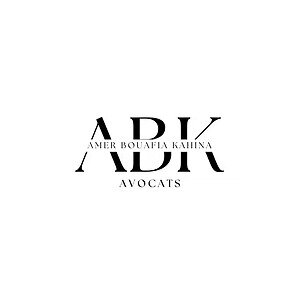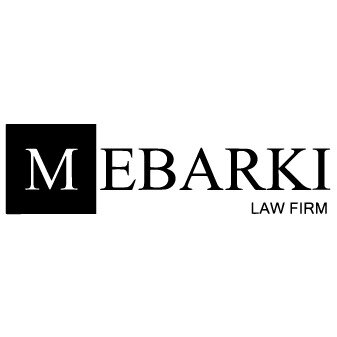Best Sanctions & Export Controls Lawyers in Algeria
Share your needs with us, get contacted by law firms.
Free. Takes 2 min.
Or refine your search by selecting a city:
List of the best lawyers in Algeria
About Sanctions & Export Controls Law in Algeria
Sanctions and export controls are vital components of Algeria’s legal system, regulating the cross-border transfer of goods, technologies, and services. These laws are in place to protect national security, comply with international commitments, and prevent illegal trade activities, such as weapons proliferation or the transfer of dual-use technologies. The Algerian government aligns its export control policies with international standards, especially those determined by the United Nations and regional organizations. Sanctions typically restrict transactions with certain countries, entities, or individuals in accordance with Algeria’s foreign policy and international obligations.
Why You May Need a Lawyer
Navigating Algeria’s sanctions and export controls laws can be challenging for businesses and individuals. Legal guidance can be essential in several situations, including:
- Seeking authorization for the export or import of controlled goods or services
- Facing accusations of violating export control or sanction regulations
- Receiving notice of investigation or enforcement action from Algerian authorities
- Conducting due diligence for potential international business partners
- Interpreting complex local and international regulations that affect trade
- Ensuring compliance with both Algerian laws and relevant foreign sanctions
- Managing supply chain risks and contract clauses related to export restrictions
- Restoring trade privileges after sanctions breaches
- Assisting with voluntary disclosures to authorities
- Providing training or guidance to company employees on compliance issues
A lawyer with expertise in sanctions and export controls can help prevent legal complications and safeguard your interests.
Local Laws Overview
Algeria’s legislative framework for sanctions and export controls is shaped both by domestic laws and its international commitments. Here are a few key aspects:
- The Algerian Penal Code and Customs Code contain provisions that prohibit unauthorized exports of certain goods, especially those related to defense, security, or controlled technologies.
- The Ministry of Trade and the Ministry of Finance are responsible for trade regulations and licensing requirements. For specific goods, such as military equipment, additional authorization may be needed from the Ministry of National Defence.
- Algeria enforces United Nations Security Council sanctions as required. This may restrict transactions with specified countries, individuals, or entities, including asset freezes and embargoes.
- Dual-use goods (items with both civilian and military applications) are subject to stricter scrutiny, and exporters must obtain prior authorization for their movement.
- The government periodically updates its control lists and guidance to reflect new international obligations or security concerns.
- Penalties for violating export control or sanctions regulations can include severe fines, loss of trade privileges, confiscation of goods, and criminal prosecution.
Understanding these requirements is critical before engaging in cross-border trade or any transaction involving sensitive goods, technologies, or countries subject to sanctions.
Frequently Asked Questions
What are sanctions and export controls?
Sanctions are measures imposed by governments to restrict activities with specific countries, entities, or individuals, usually for security or foreign policy reasons. Export controls regulate the transfer of certain goods, software, and technologies to prevent misuse or illicit trade.
Who administers export controls in Algeria?
The Ministry of Trade and the Ministry of Finance oversee most export control regulations in Algeria. For military and dual-use items, the Ministry of National Defence may also be involved.
What types of goods are subject to export controls in Algeria?
Military equipment, dual-use items, certain chemicals, technology with potential military applications, and goods specified on control lists are subject to export controls.
Are there specific countries or entities Algerian companies cannot do business with?
Yes. Algeria enforces United Nations Security Council sanctions, so transactions with some countries, individuals, or organizations may be restricted or prohibited.
Do I need a license to export goods from Algeria?
For certain controlled goods or technologies, you may need prior authorization or an export license from the relevant regulatory authorities before exporting.
What are the penalties for violating export controls or sanctions in Algeria?
Violations can lead to criminal prosecution, substantial fines, imprisonment, confiscation of goods, and loss of trading privileges.
How do I know if my product or business requires export authorization?
You should review current Algerian control lists and consult with a legal expert or the relevant ministry to determine if your goods or services are subject to export controls.
Can a foreign company be affected by Algerian export controls?
Yes. Foreign companies operating in Algeria or working with Algerian partners must comply with local export controls and sanctions when dealing with designated goods or entities.
What should I do if I suspect a violation of export controls?
Seek immediate legal advice. In some cases, voluntary disclosure to the relevant authorities may mitigate penalties but legal guidance is crucial.
How often do Algerian sanctions and export control laws change?
Regulations can change periodically, especially in response to new international obligations or security risks. Regularly consult official government sources or legal professionals to stay updated.
Additional Resources
For further information or assistance regarding sanctions and export controls in Algeria, consider consulting the following bodies:
- Ministry of Trade (Direction Générale du Commerce Extérieur)
- Ministry of Finance (Direction Générale des Douanes)
- Ministry of National Defence (for military and dual-use items)
- Chamber of Commerce and Industry of Algeria
- Trade and customs legal practitioners specializing in international commerce
- United Nations Security Council Sanctions Committees (for international sanctions listings)
These organizations can provide authoritative guidance, official forms, and updates on regulatory changes.
Next Steps
If you or your business is engaged in cross-border commerce or technology transfers, or you face questions regarding Algeria’s sanctions and export controls, you should:
- Gather and review all relevant documentation concerning your goods, transactions, and partners
- Contact the appropriate government department to clarify licensing requirements if unsure
- Seek legal counsel from a lawyer or firm with experience in Sanctions & Export Controls law in Algeria
- Arrange for compliance training for your staff if your business frequently deals with controlled goods
- Stay informed about updates in the law by monitoring government notices and consulting with professional advisors regularly
Being proactive and seeking expert advice will help you avoid costly mistakes and ensure that your activities comply with Algerian law and international obligations.
Lawzana helps you find the best lawyers and law firms in Algeria through a curated and pre-screened list of qualified legal professionals. Our platform offers rankings and detailed profiles of attorneys and law firms, allowing you to compare based on practice areas, including Sanctions & Export Controls, experience, and client feedback.
Each profile includes a description of the firm's areas of practice, client reviews, team members and partners, year of establishment, spoken languages, office locations, contact information, social media presence, and any published articles or resources. Most firms on our platform speak English and are experienced in both local and international legal matters.
Get a quote from top-rated law firms in Algeria — quickly, securely, and without unnecessary hassle.
Disclaimer:
The information provided on this page is for general informational purposes only and does not constitute legal advice. While we strive to ensure the accuracy and relevance of the content, legal information may change over time, and interpretations of the law can vary. You should always consult with a qualified legal professional for advice specific to your situation.
We disclaim all liability for actions taken or not taken based on the content of this page. If you believe any information is incorrect or outdated, please contact us, and we will review and update it where appropriate.
Browse sanctions & export controls law firms by city in Algeria
Refine your search by selecting a city.












